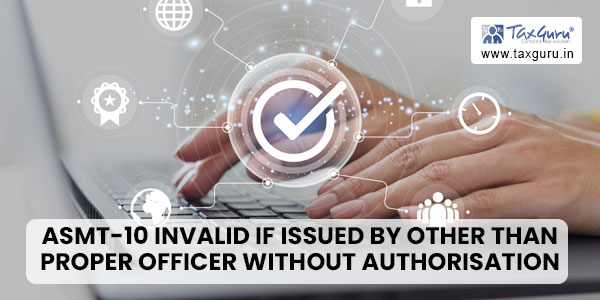Understand the significance of Proper Officer’s authorization in issuing notices under Section 61 read with Rule 99 of the CGST Act. Learn from a recent case involving M/s. Sudhakar Traders, where the High Court set aside a notice due to lack of Proper Officer’s authorization. Stay informed about the legal provisions and ensure adherence to transparency and legality in the scrutiny process.
Section 61 read with Rule 99 of the Central Goods and Services Tax (CGST) Act provides the authority to the Proper Officer to scrutinize the returns submitted by registered persons. This ensures that the tax compliance of businesses is properly examined and any discrepancies or non-compliance can be addressed. The definition of the Proper Officer under Section 2(91) of the CGST Act clarifies that it refers to the Commissioner or an officer of the central tax who is assigned the relevant function by the Commissioner in the Board.

However, a recent case involving M/s. Sudhakar Traders, Kurnool Vs. The State of Andhra Pradesh (W.P.Nos.6599 and 6601 of 2023), shed light on the importance of the Proper Officer’s authorization in issuing notices under Section 61 read with Rule 99. The Hon’ble High Court of Andhra Pradesh, in its judgment dated 25-04-2023, set aside a notice issued under Section 61 due to lack of authorization by the Proper Officer. The notice in the form of ASMT-10 was issued by a Deputy Commissioner without the required authorization as per the law.
The Court held that the 3rd respondent who issued the impugned notices is the Deputy Commissioner (ST) but not the Chief Commissioner. Therefore, in order to issue the impugned notices, the 3rd respondent requires the authorization of the Chief Commissioner assigning the task of issuing notices under Rule 99 r/w Section 61 of the Act. In the impugned notices, neither any reference is made about such authorization nor it was filed separately in the Court. Therefore, we are constrained to hold that the two impugned notices suffer the vice of lack of authorization by the Proper Officer i.e., Chief Commissioner. Therefore, the impugned notices are liable to be set aside.
Thus, notice issued under section 61 read with rule 99 CGST shall be invalid if such notice has been issued other than the Proper Officer.
The case of M/s. Sudhakar Traders highlights the significance of adhering to the authorization requirement for issuing notices under Section 61 read with Rule 99 of the CGST Act. The Court emphasized that only the Proper Officer, specifically the Chief Commissioner or an authorized officer assigned by the Chief Commissioner, can issue such notices. In the absence of proper authorization, the notices are considered invalid.
It is crucial for tax authorities to strictly adhere to the legal provisions and ensure that the Proper Officer’s authorization is obtained before issuing notices. This ensures that the scrutiny process is conducted by the designated authority, maintaining transparency and legality. By upholding the requirement for proper authorization, the court’s decision serves as a reminder to all concerned parties that the validity of a notice under Section 61 read with Rule 99 of the CGST Act is contingent upon it being issued by the authorized Proper Officer.
*****
To reach to me for any suggestions, rectifications, amendments and/or further clarifications in regard to this article my email address is pkmgstupdate@gmail.com.





